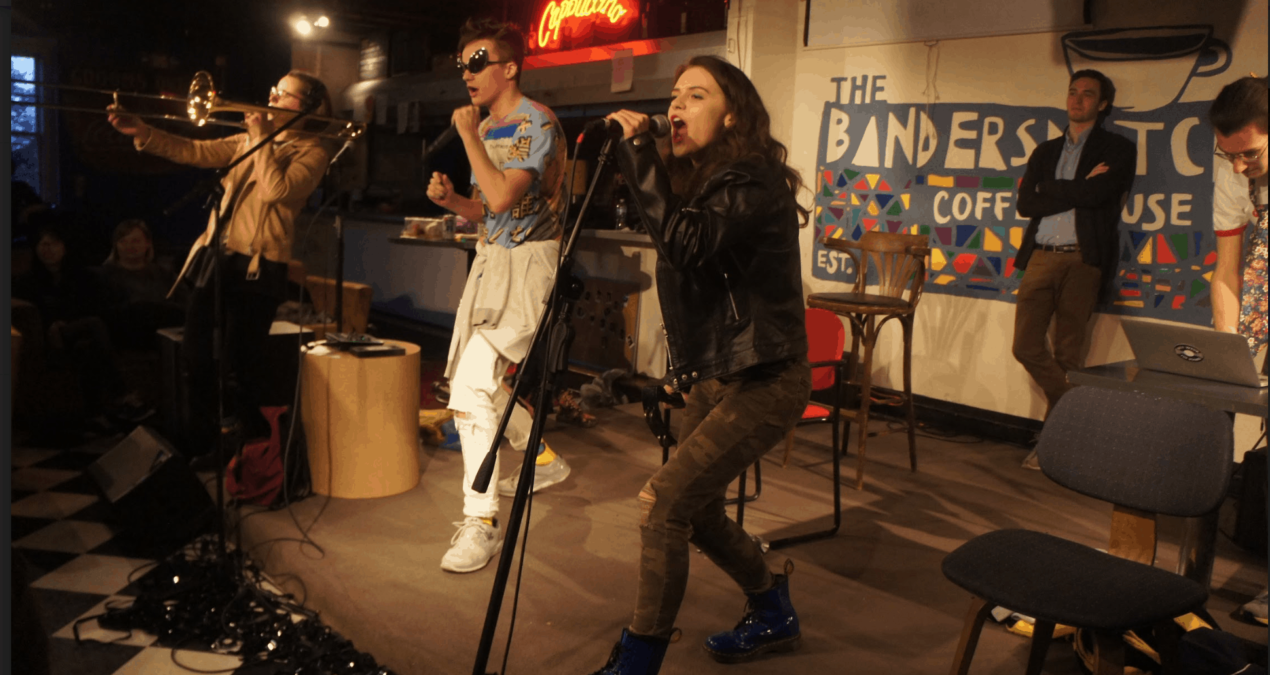Denison’s Fringe Festival, though an annual event, was particularly sentimental this year. Ace Morgan Theatre, a Denison University staple since 1956, is scheduled to be demolished at the end of this semester to make way for the new Michael D. Eisner Center for the Performing Arts. Though this new arts center will be a more high-tech and modern facility, it’s been emotional for students and staff to say goodbye to Ace Morgan.
Jordan Zelvin ’21, an education and theater double major, says that even though she’s only had one year in Ace Morgan, there’s something “so classic and loving” about the building. She acknowledges the exciting benefits that will come with a brand new performing arts space, and is excited to collaborate with other departments, but will miss the theater department having a space of its own.
The theater department’s fond farewell came in the form of Saturday night’s reading of Beggar on Horseback, chosen because it was the first play ever produced at Ace Morgan Theatre the year it opened. Beggar on Horseback was the central installment of this year’s Fringe Festival, which began ten days earlier. What differentiates the Fringe Festival from Denison’s other theatrical productions is its composition and its location; this year’s Festival was comprised of eleven different student-run shows, and takes place everywhere from the Bio Reserve to the basement of Swasey Chapel, in historical Fringe Festival tradition.
The Fringe Festival began April 18 and ends May 3, so the Denison community is still able to see its final installments: Trenches, Wednesday night at 7:50 p.m. in the Bio Reserve, and Fake News: A Theatrical Investigation into a Performer’s Place in Politics Thursday at 8 p.m. in Slayter Auditorium. A few of the Fringe Festival performances are featured below.
Jamie Ver.m1llion
This year’s Fringe Festival kicked off with “Jamie Ver.m1llion,” a futuristic musical that followed a rock band with an unusual sound. “Jamie Verm1llion” was performed during Doobiepalooza, but also played to packed audiences at the Bandersnatch. The show was written by Diego Rubey and co-directed by Maggie Chamberlain and Sophia Menconi. Chamberlain ‘19, a communication and theater double major, jumped at the chance to co-direct this show when Rubey asked, saying that she’d always wanted to work with him. The show opened with an outrageous musical number, and when actress Anna Mae Murphy sang “Everybody stand up,” audience members did just that, dancing wildly in any open space they could find.
The plot jumped around in time and space, following the rise and fall of the fictional band “Jamie Ver.m1llion” as told years later by a historian who is advocating for the band’s music to be included in a universal library. Even though the story was unique and engaging, what really stood out to audience members were the musical numbers.
The “band” consisted of Anna Mae Murphy ’21 singing, Aidan Iannarino ’20 yelling into an auto tuned microphone, and the crowd favorite, Maren Clark ’21 playing the trombone. Audience member and communication and philosophy major Natania Chaskes ’21 commented that, “This show increased my appreciation of the trombone by tenfold.” It was clear the cast loved this show just as much as the audience did; ensemble member Maggie McCann, a creative writing major and theater minor, heard such good things about the “Jamie Ver.m1llion” script that she made sure she auditioned specifically for this show.
Something Wicked: Excerpts from Macbeth
“Something Wicked” was conceptualized by its directors Sarah Wilson ’20 and Sophia Menconi ’20 after they got to talking about their mutual love of Shakespeare, and Macbeth in particular. Menconi, a theater and English double major, had wanted to do a show in the basement of Swasey Chapel since freshman year, and saw Macbeth as the perfect show to perform in the eerie space.
Menconi and Wilson cut Shakespeare’s tragic play down to 40 minutes by choosing to focus not on the cruel ambition of the Macbeths. Menconi says there is enough textual evidence within the play to imply that the Macbeths lost a child, so they chose excerpts that suggest the grief that plagues the couple. This is manifested in the form of a ghostly child, who trails behind the Macbeths as they decide to murder King Duncan.
The show began in a narrow hallway with the audience sitting on either side of the performers, opening with Macbeth’s infamous witches. Cast members each played multiple characters, as signified by the many costume changes. Dim lights lined the Swasey basement, which actors would turn on or off depending on the scene.
The directors’ decision to cut out Macbeth’s subplots allowed the audience to be fully immersed in the grief and desperation of Macbeth and his wife.
Selected pieces from Genital Monologues
Outside of Curtis West, performers squinted through the intense sunlight as they read their monologues and poems to audience members and passersby. The Genital Monologues are Denison’s all-inclusive take on the Vagina Monologues, and are organized each year by a small group of devoted volunteers called the G-Team. At the beginning of the second semester, original works can be submitted for the Genital Monologues, which are selected by student directors, who then hold auditions to cast each monologue.
The Fringe Festival gave the G-Team an opportunity to reprise their Genital Monologues. The performances were guerrilla-style, with the G-Team disappearing as soon as they finished their brief show. Pieces chosen to be performed were audience and performer favorites transposed for west quad. The actresses shared very personal stories about beloved friends, breakups, sexual assault and the process of coming out.
With a wide range of dates and topics, Denison’s Fringe Festival truly has something for everyone. The Fringe Festival is a testament to the phenomenal work students can produce
Even though Fringe Festival is an annual event, saying goodbye to Ace Morgan Theatre made this year’s particularly sentimental for casts and audiences alike.

